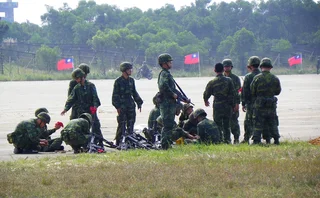
Airlines use aircraft as alternative to cash in margin calls
Airlines with fleets of unencumbered aircraft are starting to use them instead of cash as collateral required for large margin calls in derivatives trades, such as fuel hedges.
The dislocation in the world's energy markets last year forced many airlines to post large amounts of cash collateral with dealer counterparties, after fuel hedges transacted at the top of the market last year went against them.
"When the oil price dropped rapidly, airlines endured the double whammy of having a much greater mark-to-market loss exposure than they had envisaged and then having to post collateral from the ensuing margin calls," said one commodities derivatives dealer. "If you have a two- or three-year hedge book it can amount to a lot of money. The margin calls were huge at a time when business was not going so well, and people weren't flying as much. So those airlines that had credit support annexes in place struggled, and it was a massive obstacle to circumnavigate."
On December 31, 2008, American Airlines had $575 million of cash collateral posted with counterparties, on derivatives contracts that are required to be collateralised at approximately 90% of the fair value of the liability position. Many of the contracts were settled in the first half of this year and, as of June 30, the airline has $59 million posted with counterparties. Meanwhile Delta Airlines was required to post $1.2 billion in collateral as of December 31 last year. Most of these derivatives contracts were settled in the first half of this year.
On July 20, Southwest Airlines had approximately $425 million in cash collateral paid to its fuel hedge counterparties. The airline's total fuel hedge collateral obligations also required approximately $310 million of aircraft collateral.
The airline amended its counterparty agreements, which became effective in January this year, to reduce its exposure to cash collateral requirements. Previously, if a margin call was made on a derivatives transaction, all such collateral was required to be cash. Under the new amendment, which is in place until January 1, 2010, if the airline becomes obliged to post collateral in amounts of up to $300 million and in excess of $700 million, the airline will continue to be required to post cash collateral. However, if Southwest becomes obligated to post collateral in amounts between $300 million and $700 million, the airline has pledged 20 of its Boeing 737-700 aircraft as collateral in lieu of cash.
"The dislocation in the markets created a lot of difficulty for the airline industry with respect to hedging positions," said Scott Topping, Southwest's treasurer. "A huge liquidity issue emerged as many positions became negative and required collateral to be posted. Many airlines were scrambling to meet those cash calls. As a result of going through the crisis, we modified some of our credit support agreements to allow aircraft to be posted as collateral rather than cash. We are able to substitute unencumbered aircraft up to $900 million in place of cash. It gives us a lot more confidence in placing new hedges on the books."
The posting of aircraft as collateral might seem out of the ordinary. But dealers that also have aircraft financing businesses, and are well-versed in valuing aircraft, are not averse to accepting them as collateral. In effect, the craft will be given a logical haircut and the depreciation of the asset will be factored in.
"Posting aircraft is similar to other funding instruments in that you do over-collateralise the position," said Southwest's Topping. "The main thing you have to be cognisant of is that, as long as you manage this capacity, it doesn't become an issue. But it does take capacity away to raise money. The aircraft are tagged and they can't be used to do secured financing."
Some dealers have suggested the practice could be imitated by other airlines. "By using pools of unencumbered aircraft as collateral, airlines will be able to free up unwanted pressure on their balance sheets, and if dealers are willing to accept the collateral, then the practice might become more prevalent," said one London-based corporate derivatives dealer.
"In theory, if your balance sheet is stretched, the use of aircraft as collateral will provide a huge relief, and the airline will be able to have cash free for operational expenses," said one European airline treasurer. "But using these aircraft will hamper the airline's ability to raise cash."
However certain over-the-counter derivatives proposals put forward by regulatory authorities in the US and Europe could put an end to the use of aircraft as collateral. Certain derivatives trades dealt with bilaterally might be required to be novated to a central counterparty (CCP) for clearing and netting, which will mean airlines would be forced to adhere to formal agreements to put up margin based on daily mark-to-market valuations. Meanwhile non-CCP trades might be required to have more exposures collateralised with more frequent revaluations.
"If some of the proposals are passed then it is highly unlikely that a CCP will accept aircraft as collateral, customised collateral will be outlawed," said one commodities derivatives dealer. "But what is more salient, and this is true for all corporates, is that very few have the capacity to deal with daily margining requirements and a move to CCP formal agreements will place a great strain on the resources of these companies."
See also: Airlines bide their time on fuel hedges after 2008 losses
Flight plan
Only users who have a paid subscription or are part of a corporate subscription are able to print or copy content.
To access these options, along with all other subscription benefits, please contact info@risk.net or view our subscription options here: http://subscriptions.risk.net/subscribe
You are currently unable to print this content. Please contact info@risk.net to find out more.
You are currently unable to copy this content. Please contact info@risk.net to find out more.
Copyright Infopro Digital Limited. All rights reserved.
You may share this content using our article tools. Printing this content is for the sole use of the Authorised User (named subscriber), as outlined in our terms and conditions - https://www.infopro-insight.com/terms-conditions/insight-subscriptions/
If you would like to purchase additional rights please email info@risk.net
Copyright Infopro Digital Limited. All rights reserved.
You may share this content using our article tools. Copying this content is for the sole use of the Authorised User (named subscriber), as outlined in our terms and conditions - https://www.infopro-insight.com/terms-conditions/insight-subscriptions/
If you would like to purchase additional rights please email info@risk.net
More on Risk management
Op risk data: Tech glitch gives customers unlimited funds
Also: Payback for slow Paycheck Protection payouts; SEC hits out at AI washing. Data by ORX News
The American way: a stress-test substitute for Basel’s IRRBB?
Bankers divided over new CCAR scenario designed to bridge supervisory gap exposed by SVB failure
Industry warns CFTC against rushing to regulate AI for trading
Vote on workplan pulled amid calls to avoid duplicating rules from other regulatory agencies
Top 10 op risks: Change brings challenges as banks splash the cash
Higher interest margins and a trend toward insourcing drive major tech projects
Top 10 op risks: deepfakes drive rise in fraud fears
External fraud re-enters top 10 as artificial intelligence provides new tools for criminals
Should the ECB stress-test counterparty default risks?
The US Fed already does, but it is notable that EU banks were less exposed to Archegos
Top 10 op risks: third parties stoke cyber risk
High-profile hacks on market infrastructures and vendors expose linkage between top three risks
Beware war exclusions in cyber insurance, risk managers told
Risk Live: Experts say policy wording is tightening up following rise in ransomware attacks
Most read
- Top 10 operational risks for 2024
- The American way: a stress-test substitute for Basel’s IRRBB?
- Filling gaps in market data with optimal transport







